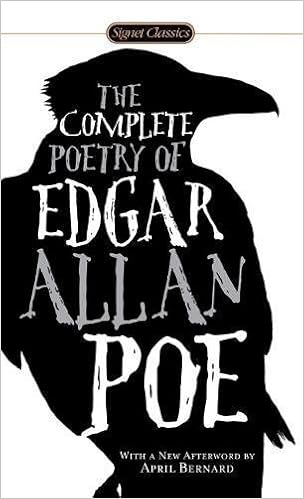
This pocket edition of the Poetical Works of Edgar A. Poe is illustrated with a very much idealized portrait of the author. The poems are introduced by an original memoir, which, without eulogy or anathema, gives a clear and succinct account of that singular and wayward genius. The copies of verses are many in number, and most of them are chiefly remarkable for their art, rather than for their power of awakening either pleasing or profound emotion. It is one poem alone which makes an edition of these works emphatically called for. That poem, it is nearly superfluous to mention, is "The Raven," and truly it is unforgetable. In this weird and wonderful creation, art holds equal dominion with feeling. The form not only never yields to the sweep of the thought, but that thought, touching and fearful as is its tone, is made to turn and double fantastically, almost playfully, in many of the lines. The croak of the raven is taken up and moulded into rhyme by a nimble, if not a mocking spirit; and, fascinating as is the rhythmic movement of the verse, it appears like the dancing of the daughter of Herodias. This looks incongruous; and so do the words of the fool which Shakespeare has intermingled with the agonies and imprecations of Lear. In the tragedy, this is held to be a consummate stroke of art, and certainly the reader is grateful for the relief. Had Poe a similar design? Closely analyzed, this song seems the very ecstasy of fancy; as if the haunting apparition inspired the poet more than it appalled the man. We can call to mind no one who had ever played with an inexplicable horror more daintily or more impressively; and, whether premeditated or spontaneous, it is an epitome of the life of the writer, for the marked traits of his character are there, and almost the prevailing expression of his countenance.
Alone
From childhood's hour I have not been
As others were; I have not seen
As others saw; I could not bring
My passions from a common spring.
From the same source I have not taken
My sorrow; I could not awaken
My heart to joy at the same tone;
And all I loved, I loved alone.
Then- in my childhood, in the dawn
Of a most stormy life- was drawn
From every depth of good and ill
The mystery which binds me still:
From the torrent, or the fountain,
From the red cliff of the mountain,
From the sun that round me rolled
In its autumn tint of gold,
From the lightning in the sky
As it passed me flying by,
From the thunder and the storm,
And the cloud that took the form
(When the rest of Heaven was blue)
Of a demon in my view.
About the Author
Edgar Allan Poe was born in Boston in 1809, but was orphaned in 1811 and went to live with a foster family in Virginia. The relationship was conflicted, and the Allans withdrew their financial support after Poe had completed only one semester at the University of Virginia. He enlisted in the Army, then enrolled briefly in West Point, meanwhile publishing three volumes of poetry: Tamerlane (1827), Al Aaraaf (1829), and Poems (1831). From 1831 to 1835, he lived in Baltimore with his aunt, where despite his increasing literary success, he began a lifelong struggle with poverty and addiction to alcohol. In May 1836, he married his first cousin, Virginia Clemm, a child of thirteen. In April 1844, he moved his family to New York, and in January of the following year, his literary fortunes turned when his poem “The Raven” appeared in the New York Evening News. Overnight, he became the most talked-about man of letters in America. Early in 1847 his wife died of tuberculosis and he sank further into alcoholism. On October 3, 1849 he was found wandering the streets of Baltimore, delirious, and died four days later from an unknown cause.
No comments:
Post a Comment